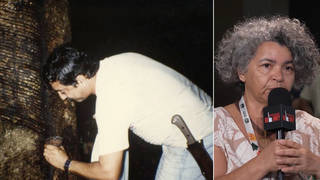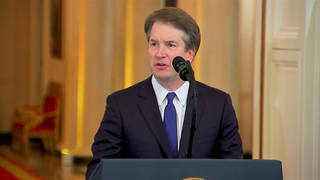
Guests
- Dahlia Lithwicksenior editor at Slate.com. She is their senior legal correspondent and Supreme Court reporter. She has been writing a series headlined “Supreme Court Breakfast Table.” The most recent in the series is headlined “Did the court just seriously wound the separation of church and state?”
- Vincent Warrenexecutive director of the Center for Constitutional Rights.
Supreme Court reporter Dahlia Lithwick examines the new make-up of the court and the rumors that Justice Anthony Kennedy might resign. Neil Gorsuch joined the court in April to replace the late Antonin Scalia. So far, Gorsuch has been in lockstep with Clarence Thomas. According to Lithwick, Gorsuch is proving to be “far to the right” of Scalia.
Transcript
AMY GOODMAN: Well, now I want to go to the speculation that has, to say the least, been percolating. During a press briefing on Monday, a reporter asked White House Press Secretary Sean Spicer about who Trump might pick as his next Supreme Court nominee.
REPORTER: Will President Trump rely on that previous list of 21 potential Supreme Court justices?
PRESS SECRETARY SEAN SPICER: I’m sure that that will definitely be a strong part of it. I can’t say that there won’t be someone added on or not. But, you know, that proved to be a very, very helpful list the first time. So, he feels very comfortable about the list, but I can’t say for certain that there’s no one that couldn’t get added to a future list.
AMY GOODMAN: So, Dahlia Lithwick, they’re talking about this speculation that Anthony Kennedy might step down. Where is it coming from, and what do you have to say about it?
DAHLIA LITHWICK: This has been a whisper campaign, Amy, that’s been going on for months now. It’s worth saying Anthony Kennedy is 80. Ruth Bader Ginsburg is 84. Steve Breyer is 78. So, while it’s certainly very likely that Trump will have another justice, or even two or three, to replace, I think that there was this feverish claim that Kennedy had a foot out the door. And no lesser a person than Chuck Grassley, than Ted Cruz, than President Trump himself hinted this spring, in the last few weeks, that there would be a vacancy, effective yesterday. And that didn’t happen.
Now, as to the question of why all the speculation was being, you know, sent around, I think it’s because there is clearly a feeling, I think, in the conservative circles and the conservative legal movement, that Trump’s one and only big win since he took office was the Neil Gorsuch nomination and confirmation, that he clearly had a spectacular success. And what better way to keep highlighting the fact that he could do it again than saying he’s going to do it again as early as this summer, he’s going to have another slot to fill? I think it’s a little bit of an effort to say to those Republicans who held their noses and voted for Trump even though they didn’t like him, because there was a Supreme Court vacancy after Scalia died—it’s a way of keeping them onside and saying, “We’re going to do it again.” And it’s probably worth saying that by about a 2-to-1 margin, folks who said to exit pollers, “I voted because of the Supreme Court,” those folks went for Trump. This is a strong constituency, and it’s good to keep promising them that they’re going to get a second effort from the president to do it again.
AMY GOODMAN: So how did Neil Gorsuch make his mark in the cases that he’s ruled on? What’s your assessment, Dahlia?
DAHLIA LITHWICK: He has been in lockstep with none other than Clarence Thomas. I think for the folks who thought he was going to be another Scalia, he is far to the right of Scalia. There was some question about maybe, in some cases, he’d actually be a centrist. We’ve seen no evidence of that. Thus far, he has really staked out the most extreme conservative positions, both on the church-state case we just talked about—he would have gone much farther than even the majority went—but also he dissented from a decision not to hear a major case out of Arkansas about putting same-sex parents, both of their names, on birth certificates, and wrote a scorching dissent suggesting almost that the Obergefell same-sex decision didn’t control in this instance. So, time after time after time, in almost every context, we’ve seen him emerge as quite a bit further to the right than even we expected.
AMY GOODMAN: I mean, on the issue of gay rights, Anthony Kennedy—you say there’s this whispering campaign that he might step down—came down forcefully in 2013 in favor of marriage equality, was the swing vote in the court’s landmark decision striking down a key section of the Defense of Marriage Act. So, the significance of the rise of Gorsuch, who was a law clerk—is that right?—of Justice Kennedy?
DAHLIA LITHWICK: That’s right. And it cannot be said often enough. In issue after issue, not just gay rights, as you suggest, but also affirmative action, last year’s major reproductive rights victory in Whole Woman’s Health, time after time after time, even conservatives really feel that Kennedy has defected and voted with the left wing of the court. In a deep way, he is a Supreme Court of one. And I think that it is clear to me that if Trump has the opportunity to replace him, we are going to see landmark losses in areas where we’ve made progress, ranging from everything I’ve just talked about to some of these other religious freedoms, possibly the gerrymander cases that are coming up this fall at the court, possibly the travel ban. Kennedy is really the bulwark, the lone bulwark, against an enormous amount of progressive losses, going forward. And I think that the fact that Gorsuch, a former clerk, was picked to fill Scalia’s seat was an effort to signal to Kennedy, “Nothing to worry about here. We’re going to fill your spot with someone just like you.” And as you said, Gorsuch is not turning out to be of the Kennedy mold at all.
AMY GOODMAN: And overall, what is your assessment of this Supreme Court term?
DAHLIA LITHWICK: It was actually—yesterday was a bunch of bitter losses. I think that, with a handful of exceptions, you’re going to start to see a 5-4 bloc for fairly conservative outcomes, including staying the travel ban. I think the thing to watch is, the chief justice, John Roberts, who is very conservative, and Anthony Kennedy, who I suggested is a moderate conservative, are starting to sort of shift toward the middle. And what we’re really seeing that I think is intriguing is Samuel Alito, Neil Gorsuch and Clarence Thomas tacking very hard to the right. So, in a deep way, I think the thing to look for is this battle at the center of the court to try to figure out if there still is a center of the court and what this really hard-right threesome is going to sort of hold for us, going forward.
AMY GOODMAN: And finally, Vince Warren?
VINCENT WARREN: Yeah, I mean, I couldn’t agree with Dahlia more. It really spells bad news for justice and folks that work in this field, probably for the next couple of decades. There’s really no getting around that. And our strategies now have to be designed around trying to keep some of these cases out of the Supreme Court, if humanly possible. And that’s—
AMY GOODMAN: What does that mean?
VINCENT WARREN: Well, it means that, at some level, that you will either take losses at the lower level rather than moving them up to the Supreme Court level. It also means that wins in the lower court level and the court of appeals level means that the government or whoever you’re challenging or a corporation will be more inclined to appeal it to the Supreme Court. So then you have to change your strategies about litigating your cases in lower courts, probably taking less than what you might ultimately want, in order to avoid it from getting up into the higher courts and becoming just a disaster for the entire country.
AMY GOODMAN: Well, I want to thank you both for being with us, Vince Warren, executive director of the Center for Constitutional Rights, and Dahlia Lithwick, senior editor at Slate.com, senior legal correspondent and Supreme Court reporter.
That does it for the show. Very happy birthday to Jon Randolph!












Media Options